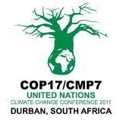 This article by David Schlosberg, professor of Government and International Relations at the University of Sydney was first published earlier today at The Conversation. It’s an excellent and forthright overview of the challenges we will face in coming to terms with the reality of climate change.
This article by David Schlosberg, professor of Government and International Relations at the University of Sydney was first published earlier today at The Conversation. It’s an excellent and forthright overview of the challenges we will face in coming to terms with the reality of climate change.
When thinking of the challenges we face in responding to climate change, it is time to admit that our political focus has been fairly narrow: limiting emissions and moving beyond carbon-based energy systems. For 30 years, prevention has been the stated goal of most political efforts, from UNFCCC negotiations to the recent carbon tax.
For anyone paying attention, it is clear that such efforts have not been enough. And now we have entered a new era in the human relationship with climate change, with a variety of broad and different challenges.
The first of our current challenges is to admit that we will not stop climate change. Prevention is no longer an option. The natural systems that regulate climate on the planet are already changing, and ecosystems that support us are shifting under our feet.
We will be a climate-challenged society for the foreseeable future, immersed in a long age of adaptation. What we might have to adapt to, what an adapted society might look like, and how we design a strategy to get there are all open questions.
One of the hopeful signs is that, even if many national governments are not preventing climate change, there is a growing concern for adaptation at the local level.
Climate change challenges the whole enlightenment project – the dream that reason leads us to uncover truths, and those truths lead to human progress and improvement.

 It’s getting embarrassing here in Durban. I’ve had a veritable flood of people come up to me in recent days saying things like “what the hell is your government doing?”
It’s getting embarrassing here in Durban. I’ve had a veritable flood of people come up to me in recent days saying things like “what the hell is your government doing?” Simon Johnson discusses the Durban UNFCCC international climate negotiations through the historic lens of the Second World War and the Rio 1992 Earth Summit.
Simon Johnson discusses the Durban UNFCCC international climate negotiations through the historic lens of the Second World War and the Rio 1992 Earth Summit.